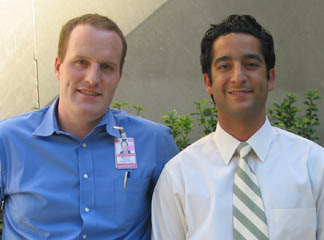Accelerated MBA program for medical students broadens their horizons amid gorges views
By Melissa Hantman

Medical science and business skill would seem to be as different as Manhattan gridlock and Ithaca gorges. But a new joint-degree, cross-campus program is set upon bridging these worlds by providing business education to graduate and medical students.
Weill Cornell Medical College and its Graduate School of Medical Sciences have partnered with the Johnson Graduate School of Management at Cornell to offer Weill Cornell students the option of earning a master of business administration (MBA) degree in an accelerated, 12-month curriculum. Under the year-old program, students pursuing an M.D. or Ph.D. degrees can join other MBA candidates for an intensive summer of core classes. In the fall, these 30 to 50 students join the second-year class of 250 MBA students to graduate in the spring. Medical students can apply for the dual M.D./MBA degree before admission to Weill Cornell or within the first three years of matriculation; graduate students can apply at any time during their studies. But students must apply to both degree programs separately and meet admissions requirements for both, including taking both the MCATs and the GMATs.
One-third of American medical schools offer a joint-degree MBA -- a trend that gained traction five years ago. The Cornell dual degree is tailored to medical and graduate students who want to pursue a career in business, preparing them for leadership roles in health organizations, pharmaceutical and biotechnology companies and other industries in the life sciences. The idea first took root in the mind of Joseph Habboushe, who will graduate from the Medical College in 2006. Even before he was accepted, Habboushe met with Dr. David Hajjar, dean of the Graduate School, to discuss a dual-degree program. After his first year he was elected student representative on the Board of Overseers, whose members warmed to the idea immediately. Habboushe and his Medical College classmate, Maya Hartman, have already been accepted to the 2006-07 MBA program.
"I want to be one of a new breed of physicians, involved in improving the structure of health care," Habboushe says. "I am interested in both health care and business, and I want to bridge the divide between them."
Each year, three medical or graduate school students are eligible for endowments to participate in the program made possible through a gift from Charles Lee, co-chief executive of Verizon, a member of the Weill Cornell Board of Overseers and a Cornell trustee emeritus and presidential councillor.
Ann Richards, acting dean of admissions at the Johnson School, describes the 12-month MBA program as an "intense, collaborative community" that integrates knowledge and practical experience, a learning method familiar to M.D. and Ph.D. students.
"Business school broadens your frame of reference and your horizons," Richards says. "The degree enables candidates to capitalize and build upon their education to become exceptionally competitive, productive physicians and scientists."
Bradley Miller completed the MBA program this spring, after three years at the Medical College; he has now returned to Weill Cornell to complete his fourth year. "I realized I wasn't dissatisfied with clinical medicine, but I was attracted to other issues within medicine," he says. Taking the GMATs, applying to the Johnson School and getting married made for a busy third year of medical school, but Miller was accepted and spent the 2004-05 academic year in Ithaca, where he also managed to squeeze in sailing and welding classes, skiing and golf. Merging medicine with business will benefit health care in this country, Miller says. "There are very few people that can cross over and understand both medicine and business. It's great that Cornell has recognized this and started this program."
Miller and two classmates studying entrepreneurship drafted a plan for a medical informatics company, which demands a level of savvy in both business and health care. The idea inspired the three to found a start-up venture in San Francisco, where Miller plans to move later this year. The program "focuses on getting you into the thick of things, the realm of leadership and managerial dealings," Miller says, "so that when you work for a company, you're not just a 'lab rat' or bench scientist working alone."
Dr. Edward Nejat completed the MBA program with Miller in Ithaca, after completing his four years at the Medical College. He is now a resident at Weill Cornell in the Department of Obstetrics and Gynecology. Nejat reasoned that devoting a year to the program before starting his residency would yield a trove of advantages and opportunities. "I plan on practicing medicine on a large scale; either hospital administration, chairman of an academic department or running a large-scale private practice," he says. "All three become much more attainable with the MBA education and credentials." His new skills in leadership, finance and negotiation will serve him well in navigating the changing landscape of health care, he says. Of his time at Cornell, he says, "It was the best year of my life."
Media Contact
Get Cornell news delivered right to your inbox.
Subscribe